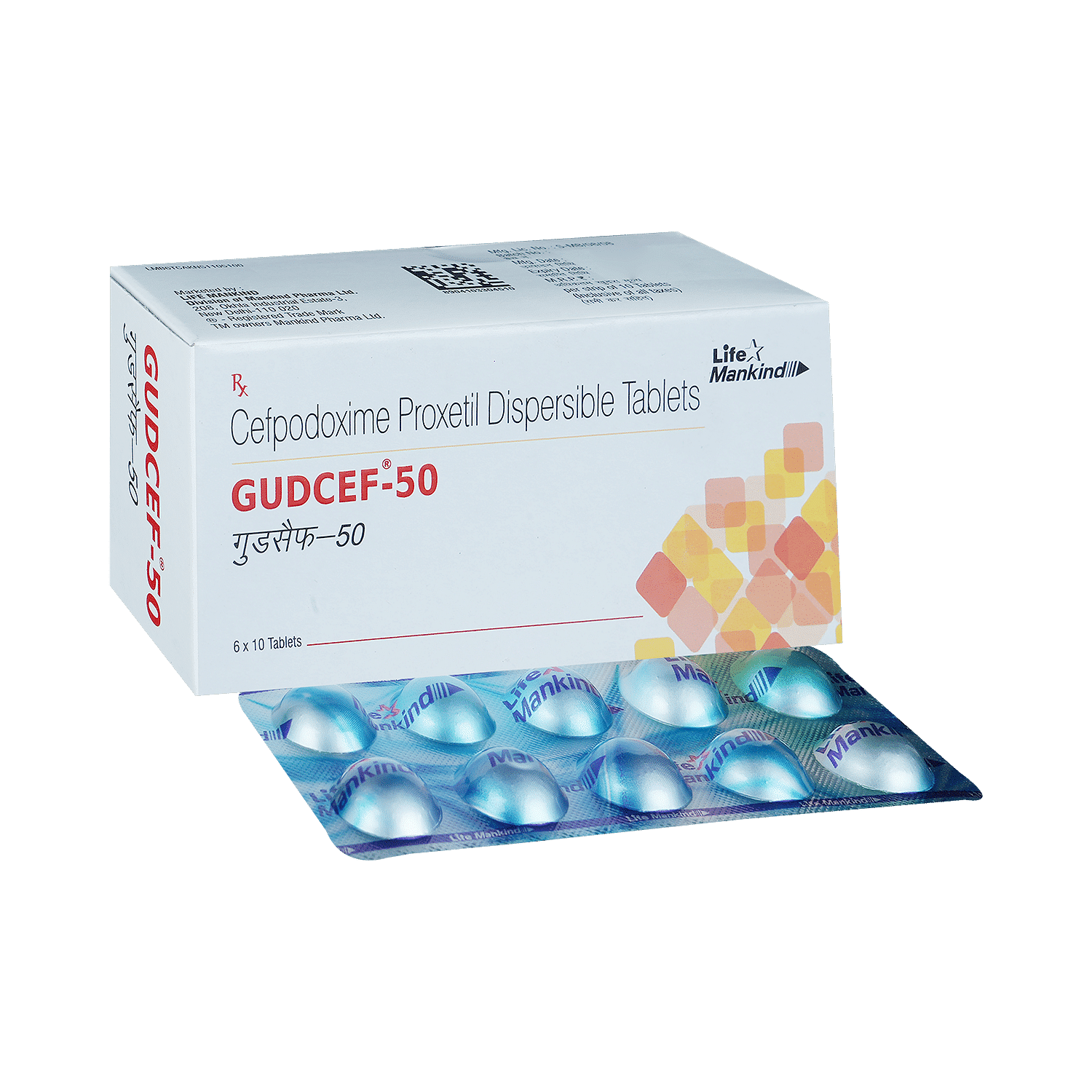
Simpod 50mg Tablet DT
Manufacturer
Mathis Pharma
Salt Composition
Cefpodoxime Proxetil (50mg)
Key Information
Short Description
Simpod 50mg Tablet DT is an antibiotic medicine used to treat a wide range of bacterial infections in children, including ear, eye, nose, throat, lung, skin, gastrointestinal tract, and urinary tract infections, as well as typhoid fever.
Dosage Form
Tablet DT
Introduction
Simpod 50mg Tablet DT is an antibiotic medicine commonly given to children for the treatment of a wide range of bacterial infections. It is effective in treating infections targeting the ears, eyes, nose, throat, lungs, skin, gastrointestinal tract, and urinary tract. It is also used to treat typhoid fever in children and adolescents.
Directions for Use
Give this medicine with food to avoid an upset stomach. Encourage your child to drink plenty of water in case diarrhea develops as a side effect.
How it works
Simpod 50mg Tablet DT is an antibiotic that works by preventing the formation of the bacterial protective covering (cell wall) which is essential for the survival of the bacteria.
Quick Tips
Your child must complete the entire course of antibiotics. Stopping too soon may cause the bacteria to multiply again or cause another infection. Give this medicine with food to avoid an upset stomach. Encourage your child to drink plenty of water in case diarrhea develops as a side effect. Conditions like common cold and flu are caused by viruses. Never use this medicine for such conditions. Only give Simpod 50mg Tablet DT to your child for their current infection. Never save medicine for future illnesses.
Related Medicines

Cefobit 50mg Tablet DT

Imdox 50mg Tablet DT

Doxpro 50mg Tablet DT

Ignipod 50mg Tablet DT

Suprapod 50mg Tablet DT

Bpodox 50mg Tablet DT

Xop 50mg Tablet DT

Delpod 50mg Tablet DT

Gudcef 50mg Tablet DT

Genocef 50mg Tablet DT
Frequently asked questions
What if I accidentally give too much of Simpod 50mg Tablet DT to my child? What should I do?
Overdosing on Simpod 50mg Tablet DT is unlikely to cause harm. However, if you think your child has received a dose that may be excessive, contact their doctor immediately for guidance. It is important to seek professional medical advice to ensure the appropriate course of action and avoid potential complications.
Are there any serious side effects associated with Simpod 50mg Tablet DT use?
Serious adverse reactions to Simpod 50mg Tablet DT include persistent vomiting, kidney damage, allergic reactions, diarrhea, and severe gastrointestinal infections. It is crucial to consult your child's doctor immediately if these or any other unusual side effects occur.
Can I administer other medicines simultaneously with Simpod 50mg Tablet DT?
Simpod 50mg Tablet DT may interact with other medications or substances. Therefore, inform your child's doctor about all other medications before initiating treatment with Simpod 50mg Tablet DT. They can provide appropriate guidance regarding interactions and potential side effects.
Can I get my child vaccinated while taking Simpod 50mg Tablet DT?
Generally, antibiotics do not interfere with vaccine ingredients or cause adverse reactions in children who have recently been vaccinated. However, it's best to wait until your child recovers from the illness before administering the vaccine. Once they feel better, vaccination can proceed.
Which laboratory tests might my child undergo while taking Simpod 50mg Tablet DT for a long duration?
Periodically, your child's doctor may prescribe kidney function tests and liver function tests to assess their overall health condition during prolonged use of Simpod 50mg Tablet DT.
My child has yellow-green mucus coming from their nose. Is this a sign of a bacterial infection?
Thickened, yellow or green mucus in the nose is not necessarily indicative of a bacterial infection. It's typically common during a typical cold where mucus thickens and changes color. Symptoms often resolve within 7-10 days.
My child has a sore throat and earache. Can I administer antibiotics for this?
No, antibiotics should not be administered for viral infections such as those affecting the ears or throat. Most cases of sore throats and ear aches are caused by viruses and antibiotic treatment is not indicated. Consult your child's doctor to determine appropriate treatment options.
Does a common cold, caused by a virus, always lead to bacterial infection? When should I start antibiotics to prevent infections?
In most cases, bacterial infections do not follow viral infections. Antibiotics are typically not recommended for viral infections as they may have minimal or no effect and can even cause side effects. Consult your child's doctor for guidance regarding the appropriate course of action.
Can Simpod 50mg Tablet DT affect my child's digestive system?
Children often experience stomach upset when taking antibiotics, as their good bacteria in the gastrointestinal tract may be affected. Simpod 50mg Tablet DT may also impact the gut microbiota by killing off beneficial bacteria, leading to increased susceptibility to other infections. If your child experiences diarrhea while on Simpod 50mg Tablet DT, contact their doctor for guidance and potential dosage adjustment.
Can Simpod 50mg Tablet DT lead to bacterial resistance in my child?
Yes, irregular antibiotic use, misuse, or non-compliance with prescribed doses can contribute to the development of antibiotic resistance. Bacteria that are not susceptible to antibiotics can emerge as a result, leading to reinfection.


